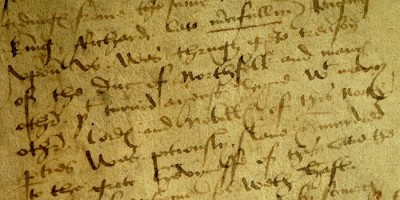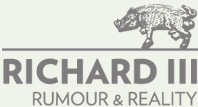Rumour, opinion, and criticism

York Council House Book entry for 23 August 1485, recording the city’s reaction to the news of Richard III’s death at the battle of Bosworth.
© Courtesy City of York Archives
Associated people
Associated places
Associated institutions
Description
The news of Richard III's death at the battle of Bosworth on 22 August 1485 was noted by York's civic leaders with great sorrow. The city had nurtured a fruitful relationship with the king, presenting him with gifts, welcoming him in splendid style, providing military support and receiving financial rewards in return. Yet his popularity across the wider city was ambiguous and glimpses of local views in the civic records highlight that opinion was divided.
Rumours of slander against the duke were investigated in 1482 and 1483, when both his inactivity and over-involvement in city affairs were said to have been criticised. In the first case, on 24 June 1482 a citizen claimed to have overheard someone say that Richard did nothing for the city, while the second instance on 14-15 February 1483 was an expression of defiance against his influence in mayoral elections.
This was alehouse gossip reported to the civic authorities and denied by those accused, but demonstrates the kinds of discussion that took place in the city and the diversity of opinions held. The quelling of such rumour preoccupied not just civic officials but monarchs. The danger of slander spreading was vigorously confronted by Richard III and he wrote to the city on 5 April 1485 to demand their adherence to his commands against sedition.
Citizens were ordered to arrest anyone heard to spread negative words about the king and immediately take down any inflammatory bills and newsletters. The situation became especially fraught in summer 1485 as news of Henry Tudor's planned invasion circulated and the city prepared to send soldiers to Richard's aid.
The king's death at Bosworth was a blow to the city whose loyalty to Richard III was so renowned that Henry VII's emissary was afraid to enter York two days later, on 24 August 1485. However, councillors were already making moves to win favour with the new king and were relieved to hear of his intended goodwill. The city welcomed Henry VII less than a year later and devised magnificent pageantry for the occasion. While pragmatism was essential in dealing with the Tudor king, Richard III continued to incite diverse opinions.
The same month that civic leaders took oaths of allegiance to Henry VII from citizens, they wrote of money granted by Richard, 'the moost famous prince of blissed memory'. Open criticism of the former king remained contentious in York. An argument recorded on 14 May 1491 saw John Payntour accuse schoolmaster William Burton of calling Richard a hypocrite and crookback who had been buried like a dog in a ditch. An inquiry into the slander was held at the council chamber on Ouse Bridge and both men were ultimately bound to keep the king's peace on pain of forfeiting 100 marks. The criticism of Richard was secondary, however, for the slander here was against the reigning king in claiming his dishonorable burial of his predecessor. Richard's memory was still alive in the city, but things had moved on.
Sources
Slander of the duke of Gloucester, 24 June 1482
York House Books vol 2 p. 696
Slander of the duke of Gloucester, 14-15 February 1483
York House Books vol 2 p. 707
Richard III's letter against sedition, 5 April 1485
York House Books vol 1 pp. 359-60
Death of Richard III, 23 August 1485
York House Books, vol 1 p. 368-69
Henry VII's messenger afraid to enter York, 24 August 1485
York House Books vol 2 p. 734
Report of slander against Richard III, 14 May 1491
R. Davies, York Records: Extracts from the Municipal Records of the City of York (1843) pp. 220-221

